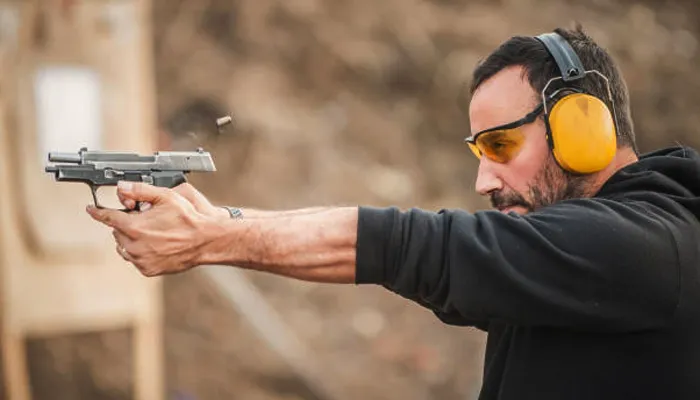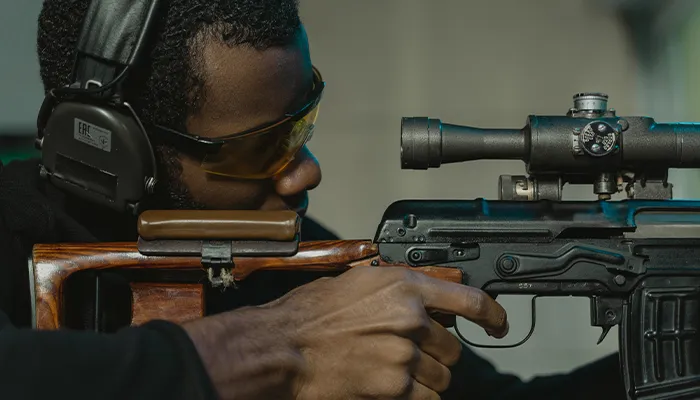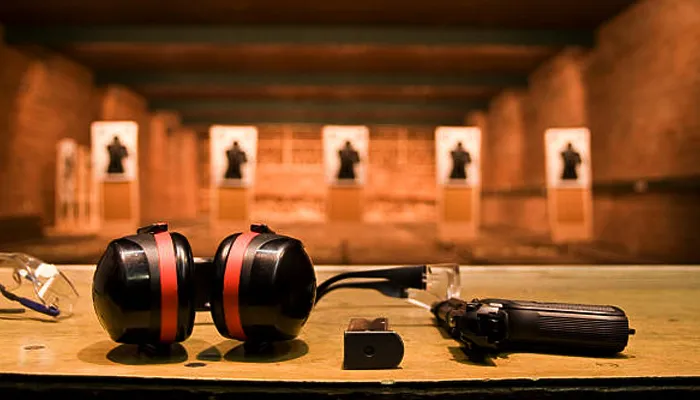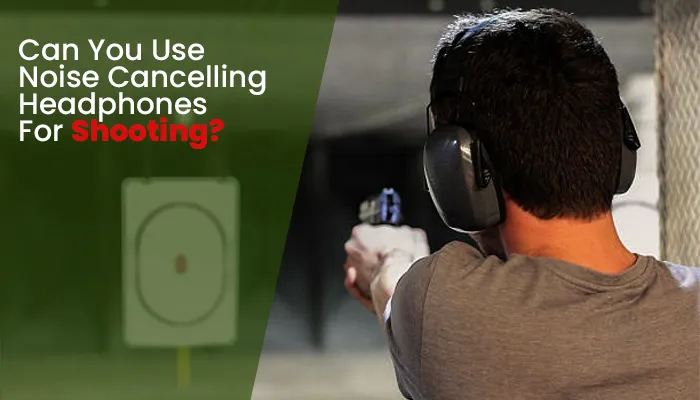Whether you’re a novice shooter or seasoned marksman, the question may arise – can you use noise cancelling headphones for shooting? It’s crucial to know that these modern devices differ significantly from custom hearing protection gear.
This article will explore how noise-cancelling headphones work and discuss if they are suitable for providing adequate ear protection while shooting. Stick around; this could save your hearing!
Key Takeaways
- Casual Noise cancelling headphones are not suitable for shooting as they do not provide sufficient protection against the loud noise generated by gunfire.
- Custom hearing protection devices/Headphones specifically designed for shooting offer better protection against loud sounds and potential hearing damage.
- While noise cancelling headphones can reduce distractions, enhance accuracy and focus, combat fatigue, and lower stress levels during shooting sessions, they should not replace proper ear protection designed for high-noise activities.
Understanding Noise Cancelling Headphones
Noise cancelling headphones work by actively reducing background noise through advanced technology.
How do noise-cancelling headphones work?
Noise cancelling headphones employ advanced technology to reduce unwanted ambient sounds. They capture and analyze the sound waves of external noises via microphones built into their structure.
Once captured, these devices generate “anti-noise” signals that effectively cancel out the original noise waveforms, leading to a significant decrease in background noises reaching your ears.
This process is adept at silencing consistent low-frequency sounds like engine hums or air conditioning units, something regular earbuds can’t typically achieve.
However, it’s important to note that they’re primarily designed for eliminating repetitive and predictable noises rather than sudden high-decibel surges synonymous with gunshots.
So while they enhance audio enjoyment in noisy environments by reducing distractions, they don’t replace custom hearing protection devices suitable for shooting ranges or hunting grounds aimed at preventing permanent hearing impairment from excessively loud sounds.
Passive vs active noise cancelling
Noise cancelling headphones fall into two categories: passive and active. Let’s kickstart the understanding with passive noise cancellation. An example is over-ear headphones, which naturally lessen background noise by creating a physical barrier between your ears and external sounds.
Although they bring some relief from high-frequency noises like chattering or traffic, their efficiency can’t compare to that of active variants.
Now let’s dive into active noise canceling (ANC). It employs advanced technology to reduce unwanted sound waves actively. These headphones produce their own sound waves that mimic incoming noise but in opposite phase – effectively “canceling out” the annoying racket.
ANC works best with consistent low-frequency sounds, such as an engine’s hum or air conditioning unit’s whirr. Despite this capability, note that noise-cancelling headphones are not designed for loud environments like shooting ranges; they don’t provide as much protection against severe auditory damage compared to custom hearing protection Headphones or earmuffs for shooting.

Using Casual Noise Cancelling Headphones for Shooting
Fancy Noise cancelling headphones are not recommended for shooting as they do not provide sufficient protection against the loud noise generated by gunfire.
Can you shoot guns with noise cancelling headphones?
Many gun shooting enthusiasts might wonder if they can use noise cancelling headphones for their activities. Unfortunately, Normal noise-cancelling headphones are not designed to protect against the extremely loud sounds produced by firearms.
They operate best at blocking sound frequencies above 1 kHz — but the booming echo of a gunshot falls much lower, in the region these devices struggle to control effectively.
Therefore, while you technically can wear them while firing a weapon, it’s imperative to understand they do not offer adequate protection like custom hearing protection devices intended explicitly for such high-decibel environments.
Prolonged exposure without proper ear protection may potentially lead to permanent hearing impairment, so it’s recommended that shooters opt for earmuffs or plugs specifically engineered with shooting safety in mind.

Noise cancelling headphones vs custom hearing protection Headphones
When it comes to shooting, one might consider whether to use noise cancelling headphones or custom hearing protection headphones.
Both are designed to offer an element of sound reduction, but their level of protection and functionality differ significantly.
Understanding these differences can help you make the right choice according to your specific needs and circumstances.
| Noise Cancelling Headphones | Custom Hearing Protection Headphones |
|---|---|
| Work by actively blocking out background noise, more effective at blocking sound above 1 kHz. | Designed specifically for protection in loud environments such as shooting ranges. |
| Passive over-ear headphones can also provide some noise reduction, but not as much as active noise-canceling headphones. | Provide superior protection against loud noises that can cause hearing impairment, crucial for preventing hearing loss while shooting. |
| May interfere with hearing protection devices, leading to potential hearing damage. | There are earmuffs and earplug designs available that offer better hearing protection during shooting. |
| Passive over-ear headphones can also provide some noise reduction, but not as much as active noise-cancelling headphones. | Noise reduction earmuffs are adjustable, offering both fit and noise cancellation features. |
| While they reduce stress and anxiety levels, they also reduce awareness of potential dangers. | Despite their cost, they are a worthy investment for the sake of hearing protection. |
Benefits of Using Noise Cancelling Headphones for Shooting
Using noise cancelling headphones for shooting offers several benefits. They reduce distractions, enhance accuracy and precision, improve concentration and focus, combat fatigue, lower stress and anxiety levels, and increase safety measures.
Reducing distractions
Using noise cancelling headphones while shooting can significantly reduce distractions and improve your overall shooting experience. By blocking out background noises and reducing the sound of gunshots, these headphones allow you to focus solely on your target and aim with precision.
This is especially beneficial for younger shooters who may be more easily distracted by surrounding noises at the range.
With noise cancelling headphones, you can eliminate any potential disturbances and maintain a clear mental state, enhancing your concentration and increasing your chances of hitting the target accurately.
Additionally, reduced distractions can also help combat fatigue during long shooting sessions, enabling you to stay focused and perform at your best consistently.
Enhancing accuracy and precision
Using noise cancelling headphones for shooting can actually enhance your accuracy and precision on the range. By blocking out distracting background noises, these headphones help you maintain focus and concentration on your target.
With reduced distractions, you are able to fully immerse yourself in the shooting experience, which can lead to improved accuracy.
Additionally, noise cancelling headphones can also combat fatigue by reducing the mental strain caused by loud sounds.
So not only do they protect your hearing, but they also contribute to a more precise and accurate shooting session.
Improving concentration and focus
Using noise cancelling headphones while shooting can significantly improve your concentration and focus. By blocking out distracting noises from the surroundings, these headphones allow you to fully immerse yourself in the activity at hand.
This enhanced focus can greatly benefit your shooting accuracy and precision, as it eliminates any external factors that may divert your attention.
Furthermore, by reducing background noise, noise cancelling headphones help create a calmer environment, allowing you to concentrate on your breathing technique and ensure steady aim.
In turn, this increased concentration not only leads to improved performance but also enhances safety measures by minimizing the risk of accidental mistakes or misfires.
So if you’re looking to enhance your shooting skills and perform at your best on the range, considering using noise cancelling headphones for that extra edge in concentration and focus.
Combating fatigue
Using noise cancelling headphones while shooting can also help combat fatigue. The loud sounds of gunshots can be mentally and physically draining, especially during prolonged shooting sessions.
Noise cancelling headphones work by blocking out the external noises, including the sharp bursts from guns, allowing you to focus more on your target without being overwhelmed by the constant bombardment of sound.
By reducing background noise and distractions, noise cancelling headphones enable you to conserve mental energy and maintain better concentration throughout your shooting session.
This can ultimately help improve accuracy and precision, as well as reduce the overall stress and anxiety levels associated with shooting activities.
Furthermore, combating fatigue is crucial for maintaining safety on the shooting range. When fatigued or mentally exhausted, it becomes easier to make mistakes or become less aware of potential dangers around you.
Using noise cancelling headphones helps in preserving mental alertness and keeping you more attuned to your surroundings.
Reducing stress and anxiety levels
Using noise cancelling headphones for shooting can help reduce stress and anxiety levels during your shooting sessions. The loud sound of gunshots can be overwhelming, especially for beginners or those sensitive to loud noises.
Noise cancelling headphones work by blocking out external sounds, creating a quieter environment that can contribute to a more relaxed shooting experience.
By reducing the noise associated with shooting, these headphones allow you to focus on your technique and aim without distractions. This increased concentration can lead to improved accuracy and precision in your shots.
Additionally, the reduced exposure to loud sounds provided by noise cancelling headphones can also help combat fatigue. Constant exposure to high-intensity noises like gunshots over an extended period can cause mental and physical exhaustion.
By minimizing this auditory stimulation with noise cancelling technology, you may find yourself feeling more energized throughout your shooting session.
Furthermore, wearing these headphones while shooting can lower stress and anxiety levels. Loud noises are known triggers for stress responses in our bodies, such as increased heart rate and heightened alertness.
By dampening these loud sounds, you may experience a greater sense of calmness during your time at the range.
Increased safety measures
Using noise cancelling headphones for shooting can provide increased safety measures. By reducing distractions and blocking out loud sounds, these headphones can help you stay focused on your target and minimize any potential risks.
With enhanced concentration and focus, you are better able to ensure proper gun handling techniques and maintain control over your firearm. Additionally, noise cancelling headphones can combat fatigue by minimizing the impact of continuous loud noises at shooting ranges or during hunting activities.
This helps to prevent a decline in cognitive function that may lead to accidents or mishaps. By reducing stress and anxiety levels, these headphones also contribute to creating a safer shooting environment where you can perform at your best without unnecessary worries or distractions.

Potential Drawbacks of Using Noise Cancelling Headphones for Shooting
Using noise cancelling headphones for shooting may have a few potential drawbacks, including reduced awareness of potential dangers, interference with hearing protection devices, and cost considerations.
Reduced awareness of potential dangers
Using noise-cancelling headphones for shooting can significantly reduce your awareness of potential dangers. While these headphones excel at blocking out loud sounds, they may also block important environmental cues that could indicate a hazardous situation.
For example, you might miss the sound of someone approaching or the commands of range officers. It’s crucial to have situational awareness when shooting to ensure your safety and the safety of others around you.
Therefore, relying solely on noise-cancelling headphones without complementing them with proper hearing protection designed for shooting can compromise your ability to react quickly and appropriately in potentially dangerous situations.
Interference with hearing protection devices
Using noise cancelling headphones for shooting can potentially interfere with the effectiveness of hearing protection devices. While noise cancelling headphones are designed to block out ambient sounds and reduce background noise, they may not provide adequate protection against the loud noises generated by gunshots.
This is especially important when it comes to preventing permanent hearing impairment.
Hearing protection devices specifically designed for shooting, such as earmuffs and earplugs, offer better protection by blocking or reducing the intensity of loud sounds.
These devices are engineered to meet safety standards and provide sufficient noise reduction in high decibel environments like shooting ranges or hunting expeditions.
It’s crucial to prioritize your hearing health when engaging in shooting activities. Instead of solely relying on noise cancelling headphones, use proper hearing protection designed explicitly for shooting purposes.
Cost considerations
Cost considerations are an important factor to keep in mind when it comes to using noise cancelling headphones for shooting. While these headphones can provide benefits such as reducing distractions and enhancing accuracy, they can also be quite expensive compared to other hearing protection options.
Custom hearing protection devices specifically designed for shooting may offer better overall protection at a lower cost. Additionally, investing in proper earplugs or earmuffs designed for shooting can be a more cost-effective solution while still providing sufficient noise reduction.
It’s crucial to prioritize protecting your hearing without breaking the bank, so exploring different options and considering long-term costs is essential.
Tips for Wearing Noise Cancelling Headphones at the Shooting Range
- Ensure that the noise cancelling headphones are securely and comfortably fitted on your ears or in your ears.
- Adjust the volume of the noise cancelling headphones to a level that allows you to hear important sounds and instructions from range officers.
- Use noise cancellation in combination with appropriate shooting ear protection, such as earmuffs or custom-molded earplugs, for optimal hearing safety.
- Be aware of your surroundings at all times, even with noise cancelling headphones on, and pay attention to any potential hazards or warnings.
- Take regular breaks from wearing noise cancelling headphones to give your ears a rest and allow them to adjust to the ambient noise levels.
- Remember that while noise cancelling headphones can reduce distracting sounds, they do not eliminate all noises, so stay vigilant when it comes to safety precautions.
That’s it! Happy shooting!
Conclusion
In conclusion, while noise cancelling headphones may provide some level of noise reduction, they are not the ideal choice for shooting activities. Custom hearing protection devices specifically designed for shooting offer better protection against loud sounds and potential hearing damage.
It’s important to prioritize safety and choose the appropriate ear protection when engaging in shooting or any other high-noise activities to prevent permanent hearing impairment.
- Charging Bluetooth Headphones During Use: Is It Possible? - January 9, 2024
- Why Over-Ear Headphones Best for Hearing Health? (7 Reasons) - December 12, 2023
- Fixing the Bose Earbuds Not Charging in Case Problem: Solutions That Work - November 24, 2023
